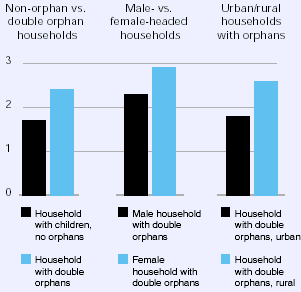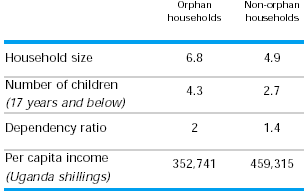A. AIDS Consequences on Children
B. Consequences on Families
C. Consequences on Communities and Society
By Eric Gondwe (a Bethel Orphanage volunteer) A. Consequences on Children 1) Decreased access to adequate nutrition, basic health care, housing, education, and clothing, 2) Street living for many in urban areas with little or no adequate support from extended family, 3) Grief and trauma over the loss of a parent(s) and living with worsened social and economic support. Parental love and emotional support is often less in foster care than from biological parents, 4) Increased psychosocial problems. A study in Brazzaville, Congo, of 354 children who had lost one or more parents to HIV/AIDS, found that 71 were suffering from some kind of psychosocial problem. Of these, 39 percent were affected by ‘posttraumatic stress’. Another 27 percent were suffering from problems of ‘adaptation’, which could take the form of running away from school or home or various types of offensive or “hyperkinetic” behavior. The final 34 percent had ‘affective’ problems: depression, anxiety, irritability, or feelings of rivalry (UNICEF, Africa’s Orphaned Generations, 2003, p.30), 5) Vulnerability to exploitation due to decreased social and economic support. Exploitation includes child labor, physical and sexual abuse, 6) Increased involvement in crime and prostitution as means to survive, 7) Decreased future prospects. UNICEF surveyed the effects orphaning has on schooling and child labor in 20 sub-Saharan African countries. In all countries, children aged 5-14 who had lost one or both parents were less likely to be in school and more likely to be working more than 40 hours a week (UNICEF, Children on the Brink 2002, p.10). B. Consequences on Families 1) Extended families assume responsibility for the orphans. Extended families often severely ill equipped have assumed responsibility for more than 90 per cent of orphaned children. A survey of four hundred households with orphans in Mwanza, Tanzania, reported that almost 40 per cent could not cover even basic expenses. The most common difficulty was school fees, including those for materials and uniforms (UNICEF, Africa’s Orphaned Generations, 2003, p.18), 2) Extended family members often share the responsibility of caring for orphans resulting in the orphaned siblings living in different homes. In Zambia, nearly 60 percent of a sample of orphaned children had been separated from their siblings; nearly four out of five saw their brothers and sisters less than once a month (Ibid., p.22), 3) Increased need for extra sources of income. A study of Ugandan households in 2000 showed that foster care increased already worsened poverty in households. Those dependent on subsistence agriculture faced an urgent need to increase cash income to pay for extra commodities. Those relying more on wage-earning activities reported that their incomes were not enough to cope with the additional mouths to feed (UNICEF, Children on the Brink 2002, p.11). 4) Decreased standards of living due to caring for extended family needs. This includes more crowded living conditions and increased family budget. Households with orphans are more likely to become poorer. This is because of the increased ‘dependency ratio,’ that is, the household income of fewer earning adults is sustaining more dependents (see Figure 5 below). In the worst-affected countries in sub-Saharan Africa, households with orphans have higher dependency ratios than those with children but no orphans (UNICEF, Africa’s Orphaned Generations, 2003, p.15), 5) Increased burden on female-headed households. In developing nations female-headed households are poorer than male-headed households. An increased burden of orphans worsens their poverty. A survey in 2002 of four Zambian districts found that the average income of female-headed households with orphans was only around half that of male-headed households with orphans (Ibid. p.17). Female-headed households with orphans, particularly in rural areas, have the highest dependency ratios. The dependency ratio indicates the number of people in a household who must rely on each adult for food security and other provisions. Among female-headed households the number is almost 3 (see Figure 6 below). Figure 5: Dependency Ratios in Uganda: Orphan households have more dependants and lower income (Source: UNICEF, Africa’s Orphaned Generations, 2003, p.15), 
Figure 6: Dependency Ratios in the United Republic of Tanzania, 1999: adults in orphan households have more dependents, particularly in female-headed households (Source: UNICEF, Africa’s Orphaned Generations, 2003, p.17) 
C. Consequences on Communities and Society 1) Increased demand for health care services. As the toll of HIV/AIDS increases the demand for health care services to help and support the patients also increases, 2) Reduced economic output. As highly skilled personnel in business, education, public management, social and medical services, and so on, become ill and die in large numbers due to HIV/AIDS, the overall economic productivity is reduced. Gains from decades of social and economic development have been reversed in a single decade in parts were AIDS has been most severe. Even rural areas have suffered drastic losses in agricultural output. In Thailand, Asia, one third of rural families affected by AIDS have experienced a halving of their agriculture output, which threatens their food security. Around 15 per cent have had to take their children out of school, and over half of the elderly have been left to fend for themselves. In Cambodia, with one of the highest rates of HIV prevalence in Asia, it is estimated that between 2000 and 2005 70 percent of AIDS-related deaths will occur among people aged 20 to 44, the most productive sector of the economy (UNICEF: Atlas03 Book 22/04, Chap. 5: Combating HIV and AIDS, p.87), 3) Expenditure on non-productive resources. HIV/AIDS employees who are significantly ill often cost their organizations and families large health bills. The Economist magazine says, “AIDS distorts spending and eats away at savings: money goes on health care, traditional ceremonies and funerals. Last year (2003) in Zimbabwe, the average expenditure on a funeral was $105. (The Economist. May 22 to 28, 2004, p.68). Between 1990 and 2000 Zimbabwe had an annual per capita income of $590 (World Bank, quoted in Microsoft® Encarta® Reference Library 2003. “African Country Economic Data”) 4) Reduced productivity. The Economist notes that, “Staff are absent (sick or at funerals); morale is low; jobs go unfulfilled; training costs are higher. Some South African firms and multinationals now offer anti-retroviral drugs to employees. Distributing them safely is costly; the alternative, though, is to let workers fall sick and die,” (ibid. p.68) 5) More social problems. These include increased prostitution, crime, violence, drugs, younger and unmarried mothers, school drop-outs and other psychosocial problems. The increases are mainly the result of orphaned children who end up with less social and economic support once their biological parent(s) dies. | 
